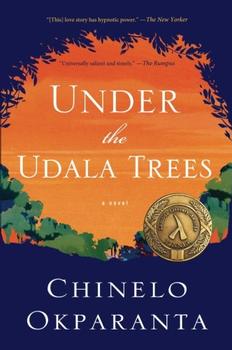Reading Guide Questions

Please be aware that this discussion guide will contain spoilers!
Questions and Discussion Points
- What did you learn about Nigeria's civil war? What role does it play in this
novel? What is the significance of Ijeoma and Amina being from separate tribes?
- What is "ubosi chi ji ehihe jie" or "the day night fell in the afternoon," and how
does it impact the lives of Ijeoma and her family? What does her father tell
Ijeoma about worrying? Why does he stay in the house rather than join his family
in the bunker?
- After her father's death, Ijeoma begins to think that perhaps the nature of life is
change. Does her view on this subject evolve throughout the story? Is change
ultimately presented as a positive force or a negative one?
- Why does Ijeoma's mother send Ijeoma off to stay with the grammar school
teacher and his wife? When Ijeoma's mother comes back for her, what is their
reconciliation like? What do these scenes reveal about their relationship?
- Does Ijeoma believe that she acted in error or feel any guilt? How do her mother's
and the teacher's responses affect her self-perception and life choices? Is she
affected by the views on sexuality that she comes to see are held by society? Is the
author offering a commentary on how LGBT citizens are treated in Nigeria today?
- Explore the effects of war on those it touches in the book. Who does the war seem
to have the greatest impact on? How are the lives of the characters altered by the
war going on around them? Does the author provide a clear sense of what the
warring groups are fighting over? Ultimately, what view of war and conflict or
message(s) about war and conflict does the author offer to her readers?
- Consider how love is defined within the novel. What examples of love are present
throughout? Look at the various relationships depicted within the story. Does any
single definition or view of love seem to stand out from all the rest?
- Ijeoma frequently recalls the folktales that were told to her as a child. What kinds
of lessons do these folktales impart? What role do folktales play, then, in teaching
concepts of "right" and "wrong" to children? What does this indicate about
storytelling and the importance of literature?
- How does Ijeoma react to the Bible lessons that she sits through with her mother?
What does Ijeoma suggest about the Bible stories that her mother reads with her?
What message or messages might this offer about allegory and the way that we
read and interpret texts?
- Evaluate the theme of faith in the novel. Consider Ijeoma's relationship to God
and religion. Is there ultimately a conflict between Ijeoma's faith and her desires?
What other examples of faith are presented in the book?
- When Amina marries, Ijeoma feels that she has been betrayed. Are there other
examples of betrayal found in the story? Do the characters regret these betrayals?
Are their choices justifiable? Do they seek or find forgiveness?
- Why does Ijeoma marry Chibundu? Evaluate the depiction of their marriage in the
story. What role does marriage seem to play within the culture? Does this help us
to better understand Ijeoma's decision?
- In Chapter 56, Ijeoma sits in church thinking about a baby who was born with a
harelip a few months earlier. Why is she so taken by this? What does Ijeoma say
that the fate of the baby reveals about the treatment of "anything outside the
norm" (228)?
- How does Chibundu treat his daughter? What do his feelings reveal about the
treatment of women and gender roles in this culture? How does this compare to
the treatment of women in other cultures? How does it compare to the treatment
of women in your own country today? Does Chibundu ever change his behavior?
- Why does Ijeoma ultimately leave Chibundu? How did Chibundu respond? And
how did you respond as a reader? Where does Ijeoma ultimately end up? Do you
consider this a happy ending?
- Explore the motif of dreams in the story. In the Epilogue, Ijeoma says, "[i]n a life
story full of dreams, there are even more dreams" (315). What does she mean by
this? How important or meaningful are dreams to the characters who have them?
What do the dreams reveal about the characters?
- At the conclusion of the story, Ijeoma speaks of her fondness for Hebrews 8 and
the importance of change and revision. Is there some way that necessary change
and the passing down of traditions can be reconciled, or will the two always be at
odds? Must traditions be discarded or eschewed for the greater benefit of society
and its members?
- What is Ijeoma's understanding of God? Where do you see different
interpretations of faith throughout the book, and what does that mean for the
different characters and their relationships with each other?
Suggestions for Further Reading
Achebe, Chinua. Things Fall Apart
Adichie, Chimamanda Ngozi. Half of a Yellow Sun
Akpan, Uwem. Say You're One of Them
Atta, Sefi. Everything Good Will Come
Cole, Teju. Open City
Danticat, Edwidge. Claire of the Sea Light
Emecheta, Buchi. The Joys of Motherhood
Hall, Radclyffe. The Well of Loneliness
Hallberg, Garth Risk. City on Fire
Matar, Hisham. In the Country of Men
Oduor, Okwiri. "My Father's Head"
Owuor, Yvonne Adhiambo. Dust
van den Berg, Laura. The Isle of Youth
White, Edmund. A Boy's Own Story
Unless otherwise stated, this discussion guide is reprinted with the permission of Mariner Books.
Any page references refer to a USA edition of the book, usually the trade paperback version, and may vary in other editions.

 Book Reviewed by:
Book Reviewed by:





